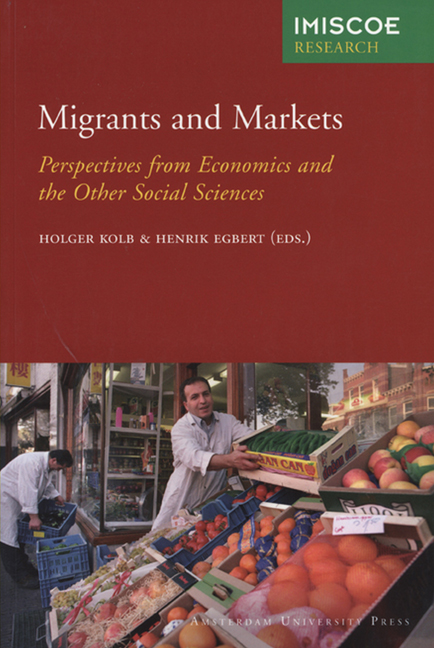Book contents
- Frontmatter
- Contents
- Introduction: Migrants and Markets: Perspectives from Economics and the Other Social Sciences
- The Impact of Immigration on the Labour Market: A Survey
- Investigating the Economic Impact of Immigration on the Host Country: The Case of Norway
- The Exit Option of Labour Migration from East to West Germany: Individual and Contextual Determinants of Unemployed Workers’ Geographic Mobility
- How Recent Amendments in German Immigration Law Affect Decisions: The Case of Polish Doctors
- Educational Selectivity and Labour Market Attainment of Jewish Immigrants from the Former Soviet Union in Israel and Germany in the 1990s
- States as Clubs? The Political Economy of State Membership
- Chinese Student Migration in Europe: A Migration That Nobody Objects To?
- Assessing Interdependencies between Sector Structures and Labour Migration: A Comparative Study of the British and the German Health Sectors
- Workers’ Remittances and International Risk Sharing
- Skills and Remittances: The Case of Afghan, Egyptian and Serbian Immigrants in Germany
- The Impact of Migration on Foreign Trade in Bolivia
- List of Contributors
- Other IMISCOE Titles
Introduction: Migrants and Markets: Perspectives from Economics and the Other Social Sciences
Published online by Cambridge University Press: 02 February 2021
- Frontmatter
- Contents
- Introduction: Migrants and Markets: Perspectives from Economics and the Other Social Sciences
- The Impact of Immigration on the Labour Market: A Survey
- Investigating the Economic Impact of Immigration on the Host Country: The Case of Norway
- The Exit Option of Labour Migration from East to West Germany: Individual and Contextual Determinants of Unemployed Workers’ Geographic Mobility
- How Recent Amendments in German Immigration Law Affect Decisions: The Case of Polish Doctors
- Educational Selectivity and Labour Market Attainment of Jewish Immigrants from the Former Soviet Union in Israel and Germany in the 1990s
- States as Clubs? The Political Economy of State Membership
- Chinese Student Migration in Europe: A Migration That Nobody Objects To?
- Assessing Interdependencies between Sector Structures and Labour Migration: A Comparative Study of the British and the German Health Sectors
- Workers’ Remittances and International Risk Sharing
- Skills and Remittances: The Case of Afghan, Egyptian and Serbian Immigrants in Germany
- The Impact of Migration on Foreign Trade in Bolivia
- List of Contributors
- Other IMISCOE Titles
Summary
Both the title of this book and the introduction suggest an idea to which the authors in this volume and many scientific authors, but not everyone from the academic discipline of economics, would fully subscribe. It implies that ‘social sciences’ is an umbrella term that constitutes a superset of disciplines, of which economics in turn is one. However, there is also an alternative interpretation of economics that the editors and authors in this book view rather critically and which recently has been gaining supporters among economists. In this interpretation there is a sharp division between economics and the social sciences that classifies both disciplines as something rather different. A further analysis of the relationship between economics and the other social sciences, with a special emphasis in the area of migration studies, was the main aim of the conference at which most of the papers in this volume were presented.
The assumed primary difference between both perspectives is of a methodological nature. Economists who subscribe to the interpretation of economics as being something different from the other social sciences consider their discipline's methodology to be scientifically accurate; contrary to many social sciences such as sociology, political science or anthropology, economics is not limited to providing only anecdotal evidence, but possesses the capacity to provide ‘hard facts’ and precise analyses. In this approach, economics resembles the natural sciences and should be understood rather as a kind of ‘economic meteorology’: based on (often very particular) assumptions, the models allow medium-range predictions of future economic developments to be made.
According to this perspective, economics refers to the scientific discipline dealing with the subject of the economy, and its analyses are restricted to those fields that define economy in the proper meaning of the term. Pies (1998: 2) used the metaphor of an ‘allotment garden colony’ to criticise this interpretation. Many economists subscribe to this understanding of a ‘landscape of science’ as such a colony, concentrating their work on the cultivation of that allotment garden that is (mis-) interpreted as the economic one, claiming exclusive responsibility for the economic realm while at the same time abstaining from any analyses outside the alleged economic sphere. One consequence of this reductionism is that any topics and research questions that do not evidently belong to the economic sphere never appear on the monitors of economists and thus are not considered as relevant research topics.
- Type
- Chapter
- Information
- Migrants and MarketsPerspectives from Economics and the Other Social Sciences, pp. 7 - 19Publisher: Amsterdam University PressPrint publication year: 2008



